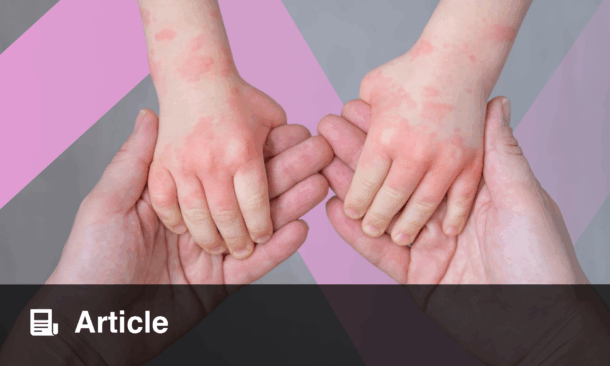ATOPIC DERMATITIS (AD) is a chronic inflammatory skin condition affecting millions worldwide and is increasingly recognised as more than a dermatological concern. Beyond its hallmark symptoms, persistent itching, inflammation, and disrupted sleep, AD can profoundly affect mental wellbeing. Recent large-scale research has highlighted the psychological burden experienced by people with atopic dermatitis and the need for more integrated mental health care within dermatology.
The Link Between Skin and Mind
A nationwide cohort study compared adults living with atopic dermatitis to those with melanocytic naevi using data from the Korean National Health Insurance Service (NHIS). Individuals with melanocytic naevi served as an appropriate control group due to their dermatologic similarity but lower expected psychiatric risk. After adjusting for factors such as age, sex, and disability status, the results revealed that 28.2% of people with atopic dermatitis had at least one psychiatric diagnosis, compared to 27.1% among controls. The adjusted odds ratio was modest but statistically significant at 1.04 (95% CI: 1.02–1.05).
This finding highlights that even small differences may have meaningful public health implications, given the high global prevalence of AD. Common psychiatric comorbidities among people with AD include depression, anxiety, and stress-related disorders, conditions that can further worsen skin symptoms through physiological stress responses and make treatment adherence more challenging. Healthcare providers should be aware that psychiatric comorbidities in people with atopic dermatitis can affect treatment outcomes and overall quality of life.
Implications for Psychiatric Comorbidities Care
While the difference between groups was smaller than in earlier European and American studies, Korea’s accessible healthcare system may partly explain this pattern. Universal health coverage and community-based mental health programmes likely promote earlier diagnosis and treatment, reducing the number of undiagnosed psychiatric conditions. Nevertheless, the findings reinforce that psychiatric comorbidities in people with atopic dermatitis remain clinically important and are often under-recognised.
Future healthcare policies should prioritise routine mental health screening for individuals living with AD and strengthen collaboration between dermatologists and mental health professionals. By acknowledging the emotional and psychological dimensions of this condition, health systems can move toward more holistic, person-centred care, addressing both the skin and the mind.
Reference
Kang T. Psychiatric comorbidities in adult patients with atopic dermatitis: a nationwide cohort study compared to melanocytic naevi. Allergies. 2025;5(4):36.








